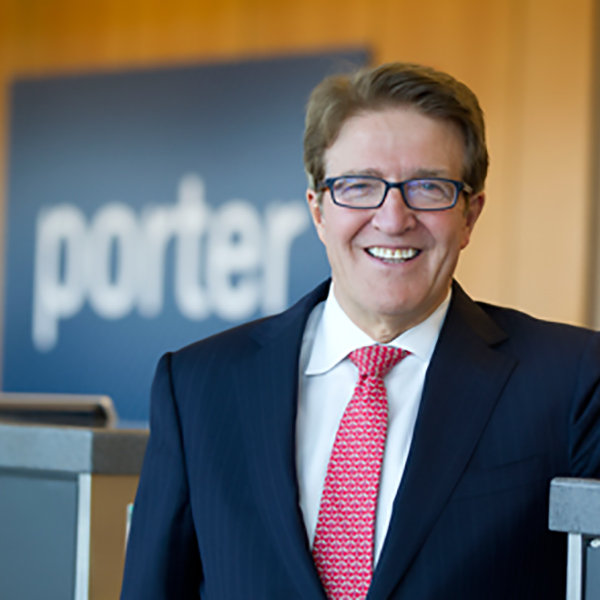When he graduated from McGill with a science degree, Robert Deluce thought he’d try his hand at aviation full-time before making any final decisions about his career path.
In the end, that was the decision, launching Deluce’s enduring career in the airline industry.
The future founder and CEO of Porter Airlines was already steeped in the industry by then.
His parents, Stanley, a Second World War RCAF veteran, and Angela, had launched White River Air Services in 1951. Deluce, who was born in northern Ontario, obtained his private and commercial flying licenses as a teenager as soon as he reached the eligible age at the time.
“The airlines business, especially if you’ve been immersed in it right from an early age, it really does have a lot of appeal,” says Deluce, BSc’71, DSc’13. “There’s the interaction with people, the fact that no two days are the same ever.”
Deluce was inducted last June into Canada’s Aviation Hall of Fame, as his late father was in 2007. He says he’s thrilled to have been recognized and notes they’re the first father-son combination to receive the honour.
A “fairly significant” worldwide pilot shortage is a challenge facing the airline industry, Deluce says. “That’s something we are working pretty hard to keep ahead of and almost every airline out there is affected in some way by this shortage,” he says.
“We are fortunate in that we may not be at the top of the food chain, we’re certainly not at the bottom, (and) we do attract a large number of very qualified candidates who apply to Porter. But it’s been necessary to reorganize our thinking and our hiring plans and to be more proactive and include more new pilot classes. We’ve been very proactive in that manner.”
The pedestrian tunnel at Billy Bishop Toronto City Airport, Porter’s main operating base, was a real game-changer, according to Deluce, removing any uncertainty from the travel experience. People can bank on it being a roughly four-minute walk, as opposed to having to wait for the ferry, which still operates.
The other airport renovations underway are a bit behind, but coming along nicely, Deluce says. “They’ll be a real improvement and they will accommodate U.S. customs pre-clearance. And there will be more passenger amenities and concessions and some other things, which are probably now needed and will add to the already attractive nature of the service and of the airport.”
We spoke with Robert Deluce recently about his career, the airline industry, and his time as a McGill student. (This interview has been condensed.)
Q. Why did you choose to come to McGill and how was your time here?
A. My three years at McGill were really enjoyable and obviously educational. I think for me it was a real game-changer in terms of coming to grips with things I wanted to do and future endeavours. Originally, I was largely attracted to McGill because of its medical program, but also because of its location in Montreal. It was the year after Expo and (it’s) a very multicultural city in every respect. It had a real buzz to it, especially compared to Toronto, which was pretty quiet in those days. And McGill was known to rank fairly high and to attract a pretty large percentage of students internationally. So all of that appealed to me and I developed a number of close friends.
Q. Porter turns 12 this fall. What do you think sets it apart? Is it the customer service/hospitality emphasis?
A. Porter’s focus right from Day 1 has been on speed, convenience and service. I think the service aspect is what I believe continues to set us apart from some of our other competitors. We’ve worked pretty hard to make Porter a different kind of airline. And we continue working at it every day with the goal of making it even better. It’s one of those businesses that you have to keep trying to make improvements and you certainly can’t rest on your laurels. By providing certain complementary amenities, including things like airport lounge access, beer and wine on board and premium snacks, we’ve been able to sort of take passengers back to the days when flying was seen as an experience that was to be appreciated and looked forward to. And I think there’s something novel about Porter that does attract individuals, and that differentiation in terms of service levels does bring customers back. We do have a pretty loyal following, for sure.
Q. I’ve read that you enjoy knowing what’s happening on the ground, talking to customers, walking through airports. Do you still do that?
A. I try to do it as often as possible. I took a walk through both international and trans-border lounges (at Billy Bishop Toronto City Airport) just a couple of days back. I do recognize multiple passengers and others recognize me, and come over and want to talk. And generally, that’s a pretty appreciative group of passengers who really have benefited from the differentiated level of service and the downtown location, and everything else that is very much a part of Porter. But it’s always interesting to get feedback from passengers. Sometimes it’s just say, a response that’s in the realm of ‘I love Porter’. But other times it’s feedback – useful, in terms of something that maybe could be better. Nothing like getting it directly from those who use this service on a regular basis. So that’s valuable. The other aspect is that you do get to see your team members whether they’re flight crew or at a customer service desk or on the ramp. Those team members generally appreciate having the chance to interact.
Q. Are you concerned about the competition from these new ultra-low cost carriers?
A. I think it’s a different model. It’s one that’s proven successful elsewhere. It’s kind of a new concept for Canada. As I see it, the emphasis isn’t necessarily on those short-haul, regional routes that we tend to specialize in, but other types of routing from non-hub cities to places that are only accessible with connections. In our particular instance, I think the downtown Billy Bishop Toronto City Airport does give us a significant advantage. It’s a timesaving and a cost-saving element to our overall level of service, at least when you fly through this particular hub. And I think as well, the increased level of customer service that typically comes with a Porter (flight) is well appreciated by those high-frequency business travellers, which do form still the majority of our passengers. I wouldn’t suggest that we’re not watching it, but we’re not concerned about it. I think what we’re offering still has a significant differentiation and value and is a real time-saver.



